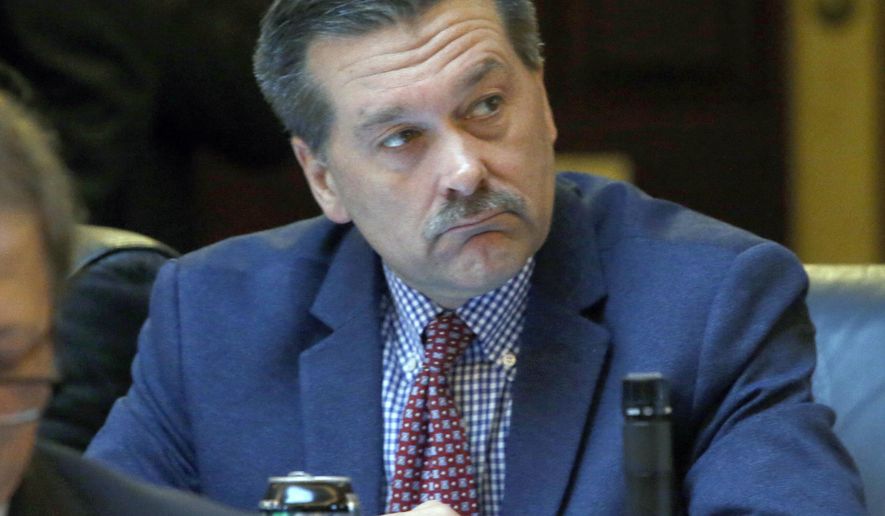GOP-led states that had been reluctant to expand Medicaid under President Obama are suddenly giving it another look after the Trump administration said last month they can require those on the program to also hold down jobs.
Virginia’s Republican-controlled House of Delegates is pushing a budget that would balloon Medicaid under Obamacare — delivering a long-sought victory to Democrats — but also require able-bodied enrollees to seek work training.
Delegates from southwest Virginia pointed to a similar experiment in neighboring Kentucky, which last month became the first state in the nation to require Medicaid recipients work or engage in the community.
“Requirements such as these have strong support among taxpayers nationally. This option has real possibilities in Virginia,” Del. Terry G. Kilgore, a Republican, said in a recent op-ed for the Roanoke Times.
It’s the latest twist in the GOP’s delicate dance with the Affordable Care Act, which is still the law of the land more than a year after Republicans seized control of the White House and Congress.
Mr. Trump insists the law is failing and should be replaced with a state block grant program that would significantly curtail federal Medicaid spending over time.
But with those efforts stuck in neutral, state Republicans from the Old Dominion to Kansas to Utah say his decision to allow work requirements makes expanding the program — a key goal of the 2010 health law’s authors — more palatable.
In Virginia, the shift was likely hastened by the pasting the GOP took in last year’s elections, seeing their House majority drop from 16 seats to just a single seat.
“I think they realize it doesn’t make sense to oppose this anymore,” said Timothy Jost, a law professor at Washington and Lee University in Virginia who closely tracks the debate. “So they’re going to get the best deal they can.”
The Virginia plan still faces hurdles in the state Senate, which didn’t include it in their budget plans, and it’s a bit of a Faustian bargain for Democratic Gov. Ralph Northam, who ran on a platform of expansion.
Yet the governor is seeing the House plan as a potential breakthrough.
“I have long supported a simple and straightforward expansion of Medicaid. However, I respect the priorities of the House majority and I am encouraged by and supportive of our work together to bring about a new ‘Virginia Way’ on Medicaid,” Mr. Northam said. “We can and should expand coverage and provide significant training resources, counseling, and incentives to connect Virginians with employment opportunities.”
Roughly 300,000 people could be added to the state’s rolls for Medicaid, which is a taxpayer-funded insurance program for the poor, run jointly by the federal government and the states.
President Obama’s sweeping 2010 health reforms called on states to vastly expand enrollment to those with incomes up to 138 percent of the poverty level.
Under his law, the federal government picked up the full cost of the expanded population from 2014 to 2016 — a share that’s down to 94 percent this year and will slide to 90 percent in 2020 and beyond.
Yet 18 states have refused to expand their programs, saying it would bust their budgets, after the Supreme Court deemed it optional.
Maine approved the expansion in a ballot initiative in November, although Gov. Paul LePage, a Republican, has resisted efforts to implement it until the state share is fully funded.
Many holdout states were counting on the GOP-led Congress to level the playing field by repealing and replacing Obamacare last year. But the effort failed, particularly because so many states have become dependent on the Medicaid money.
Without the prospect of repeal anytime soon, GOP-led states are looking to grab federal dollars that Mr. Obama put on the table, while copying efforts by states like Kentucky and Indiana to make Medicaid as conservative as possible under a like-minded Trump administration.
Utah Gov. Gary Herbert, a Republican, recently told The Washington Post that under Mr. Trump’s new approach, “there may be a window of opportunity to revisit the idea of Medicaid expansion.”
Kansas nearly expanded Medicaid last year — it fell three votes shy of overriding then-governor Sam Brownback’s veto of the effort.
Its new governor, Republican Jeff Colyer, hasn’t offered any support for expansion in any form.
Yet backers of expansion think they can use the new environment to sway conservatives into the “yes” column, so long as the conditions aren’t too extreme.
“In my opinion, the work requirements might lead more conservative members to support expansion,” Kansas state Sen. Barbara Bollier, a Republican and longtime supporter of expansion, said in an email. “And for me, the work requirements must have clear limitations for those who cannot work because of illness.”
• Tom Howell Jr. can be reached at thowell@washingtontimes.com.




Please read our comment policy before commenting.